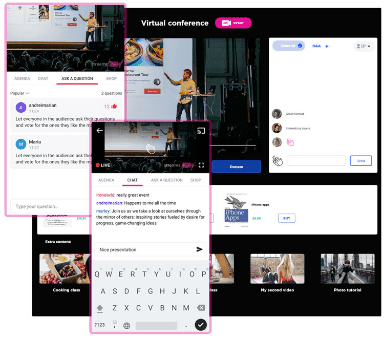
Just like in-person experiences, virtual events also need a powerful marketing campaign. While many principles remain unchanged and are to be applied just like in the real world, it is important to focus on small details that make a big difference. For online events, specific marketing strategies will keep your prospective audience engaged and eager to be part of it. Therefore, promotional activities are just as important as choosing the right speakers to offer memorable experiences. So, how do you create an effective marketing campaign for an event that is taking place in a virtual environment? To give you an answer, we’ve put together some marketing strategies designed to drive up traffic and create a real buzz.
Identify your Audience
To make sure that your marketing efforts are as relevant as possible, try to understand your prospective audience first. If you manage to identify the target persona you aim to engage with, your marketing campaign will have a better outcome.
What should you know about your prospective audience?
– Demographic information (age, location, job title, income etc.)
– Platforms where they spend time online
– Motivations and goals (hobbies, interests, aspirations etc.)
Afterwards, based on the type of virtual event hosted, you can promote it to an audience that is truly interested in the presented content. Let’s assume that you host an online recruitment event. Based on demographic information, you can filter your audience and promote the event solely to candidates that meet your company’s minimum requirements (age, experience, interests, etc.).
Involve your Speakers
Speakers or presenters are at the heart of your event. They are the ones that make audiences impatient and excited to attend and be part of your event, especially in an online environment. Therefore, promoting it can be a lot more efficient if speakers are involved in the process. It is in their own interest and usually part of their duty to cross promote their appearance to their fans.
Most of them have built a strong fan base on different social media networks. To make it easier for them to spread the word about your upcoming event, create content that is easy to share online: a pre written tweet; a high quality image of your event logo; ask them to promote it in their email signatures and so on. At the end of the day, they are equipped with the right tools to promote it most effectively and usually without any additional costs.
Send out Newsletters
The available information shows that email marketing will continue to have a key role in the event organizer’s promotional strategy. In fact, 40% of marketers consider email marketing as the most effective medium for event promotion. Even if you are new to the world of virtual events, you might already have a well-established database from your offline shows. Those are people that already trust you and sending them out a newsletter can do no harm.
Of course, there are a few things to keep in mind before pressing the send button. First, get creative and find a catchy subject line. If you booked in well-known speakers, include their names in your newsletter’s subject line. It can sound similar to this: “Mr. Johnson, join Sir Ken Robinson at the XY virtual conference”. You can see that in the example mentioned above I used some degree of personalization. If you have data from previous events, don’t hesitate to customize as much as possible for each individual. Another important aspect is to always remember the purpose of email marketing, which is ‘Call to action’ (CTA). The available information tells us that CTA should appear in the first 20% of the e-mail. Why? Well, most of us are surfing the internet from our smartphones. If the CTA is placed too far in the email, we might not even bother to scroll down and actually read it.
Use Keywords in your Event description
When was the last time you used Google to find something that interests you? I bet that it was earlier today. Among those uncountable searches that take place daily, there is no wonder that people search for events as well. There are several keyword planning tools, such as Google Ads that help you find out relevant words based on your content. As soon as you manage to find relevant keywords, simply include them in your event description.





